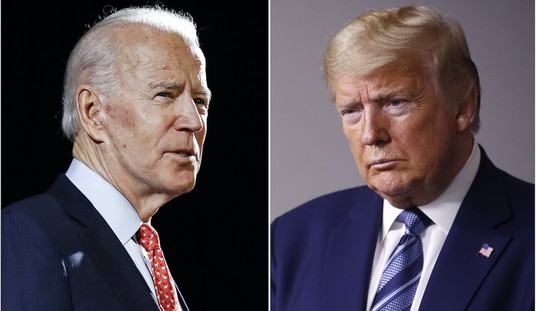At this point, it seems crystal clear that some version of police reform will come out of Congress. Both parties now say they want it, the majorities of both chambers are producing roughly similar proposals, and the White House says Donald Trump will sign it when it reaches his desk. All that’s left is who will get to take political credit for it, and that … might hold things up for a while.
Senate Republicans unveiled their version of police reform at a press conference this morning. They called the bill the Just and Unifying Solutions to Invigorate Communities Everywhere Act of 2020, a convoluted header contrived to produce the acronym JUSTICE Act. Thankfully, the proposal isn’t as bad as that suggests:
WATCH NOW: Senate Republicans unveil police reform bill https://t.co/X4tmm0y6Oz pic.twitter.com/RAK6UWGBdQ
— CBS News (@CBSNews) June 17, 2020
The GOP bill would create new reporting requirements on the use of deadly force by officers and reduce federal funding for state and local departments that fail to comply. In addition, the legislation requires that state and local governments with certain funding submit reports on no knock-warrants to the Justice Department. It would also limit eligibility for funding if a law enforcement agency does not have a policy that prohibits the use of chokeholds “except when deadly force is authorized.”
The measure also provides grants for the purchase of body cameras and development of policies and procedures related to their use. In addition, it increases penalties for false police reports and creates a Commission on the Social Status of Black Men and Boys. That bipartisan measure would provide a report on conditions that affect African American men, such as education, health care and the criminal justice system. Another commission would review the criminal justice system entirely.
The GOP bill also makes lynching a federal crime. While the House passed a widely backed anti-lynching bill in February, Sen. Rand Paul (R-Ky.) recently called for changes to the legislation to ensure that lynching charges don’t cover minor injuries. Paul’s objections resulted in a heated exchange on the Senate floor earlier this month with Sens. Kamala Harris (D-Calif.) and Cory Booker (D-N.J.).
In addition, the bill would include another bipartisan proposal that would make it a crime for a federal law enforcement official to engage in a sexual act with an individual in his or her custody or “while acting under color of law.”
This differs from the House Democrats’ bill in a few ways, mostly in terms of degree. Politico calls that bill “sweeping,” an adjective beloved by media outlets to demonstrate their own preferences, but the breadth of both bills seems rather large. The only real difference is on qualified immunity, which Senate Republicans side-stepped:
The GOP bill comes after Democrats unveiled their own sweeping measure that would ban chokeholds, limit qualified immunity for police officers and stop no-knock warrants in federal drug cases.
The chokehold issue isn’t as much of a gap as it sounds. The Republican bill would cut off federal funds for police departments that don’t ban it, while Democrats want to make its use by law enforcement a federal crime. Both approaches have their merits, but do we want more laws to enforce at the moment? We already have some entrée for federal enforcement of that issue via the DoJ’s civil-rights division, although that is admittedly a clunky and indirect approach to the issue.
At any rate, both bills largely offer the same solutions, and the differences could get easily settled in a conference committee. Will it get that far, though? Mitch McConnell sounds like he’s itching more for a fight, and House Democrats’ public rejection of the Senate plan makes it sound like they’re up for one too:
McConnell says after two circuit judges are considered, he will take the procedural steps to bring the Senate GOP policing bill to floor. Would require 60 votes. Could happen as soon as next week and would require at least seven Democrats to vote to proceed.
— Manu Raju (@mkraju) June 17, 2020
Why not just conference with Democrats now and get it over with? Everyone understands that Republicans have greater institutional leverage and Democrats have greater political leverage in this situation. GOP leaders will have to give up something on qualified immunity and potentially on no-knock warrants too, even though Tim Scott wants more data on that first.
For the most part, that’s all either of these bills provide anyway — better and more standardized data on policing. Real reform will have to come at the local and state level, and will involve breaking the links between those levels of government and the public-employee union leadership that elects those politicians. The sooner the focus returns to that level, and the more data we have that highlights those failures, the better off Republicans will be. The strategy should be clear: Play Monty Hall now, and win big prizes later.
And lose the acronym, please. That’s a modern tradition we can jettison, and the sooner the better on that one, too.







